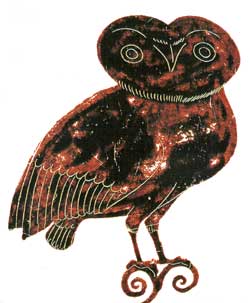Here are three examples of different transliteration schemes applied to the text of Article 1 of the Universal Declaration of Human Rights. The I.S.O. scheme is not represented here, as with a few exceptions, it is almost identical to the transliteration scheme employed by the Athens News Agency in their newspaper published on the Web. As you encounter different transliteration schemes you will see that the methods applied use the English alphabet to either mimic the Greek letters in appearance, or to reproduce the phonetic pronunciation of the Greek words.
'Ολοι οι 'ανθρωποι γεννιούνται ελεύθεροι και ίσοι στεν αξιοπρέπεια και τα δικαιώματα. Ειναι προικισμένοι με λογική και συνείδηση, και οφείλουν να συμπεριφέρονται μεταξύ τους με πνεύμα αδελφοσύνης.
Transliteration (L.C./A.L.A.):
Holoi hoi
anthrōpoi genniountai eleutheroi kai isoi stēn axioprepeia kai ta dikaiōmata. Einai proikismenoi me logikē kai syneidēsē kai opheiloun na symperipherontai metaxy tous me pneuma adelphosynēs.
Transliteration (Phonetic representation):
Óli i ánthropi yeniúnde eléftheri ke ísi stin aksioprépia ke ta dhikeómata. Íne prikizméni me loyikí ke sinídhisi, ke ofílun na simberiféronde metaksí tus me pnévma adhelfosínis.
This system of transliteration when read as written admirably
reproduces the phonetic pronunciation of the Greek words.
Transliteration (Athens News Agency)
Oloi oi anqropoi gennioyntai elefqeroi kai isoi sthn ajioprepeia kai ta dikaiwmata. Einai proikismenoi me logikh kai syneidhsh kai ofeiloyn na symperiferoyntai metajy tous me pneyma adelfosynhs.
The letters Q and J are used by the Agency to represent θ (theta) and Ξ (ksi).

Translation:
All men are born free and equal in dignity and human rights. They are endowed with reason and conscience and should act towards one another in a spirit of brotherhood.
